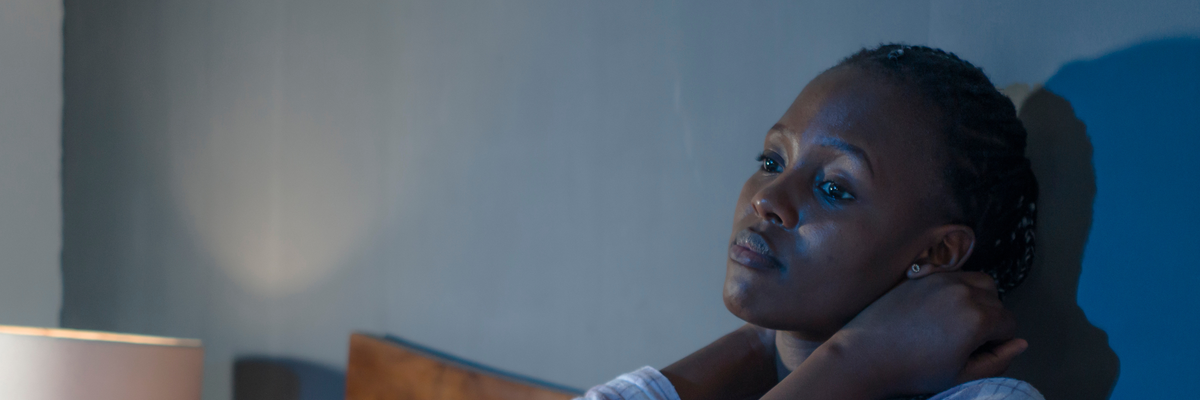Angela Bassett Just Won Her First Emmy, Here's A Look Back At Her Stellar Career

Angela Bassett's legacy keeps getting better and better. After three decades of giving us remarkable performances and racking up awards, the legendary actress can now call herself an Emmy winner.
She recently won her first Emmy for outstanding narration on National Geographic’s nature documentary Queens during the Creative Arts Emmys. She opened up about the win to a reporter. “This is one of the big ones, and that doesn’t usually happen,” she said.
“Whenever you’re acknowledged, I’m just, you know, a girl who just wanted to act. My mentors were way out ahead of me. I just looked to them and got inspiration and hope and, and I just put my focus, my energy, and my love to try to make it happen in my life and for my life.”
She concluded, “So each and every day, I try to remember that first love, and when this happens, I appreciate it.” In honor of Angela's recent achievement, we take a look at her extraordinary career.
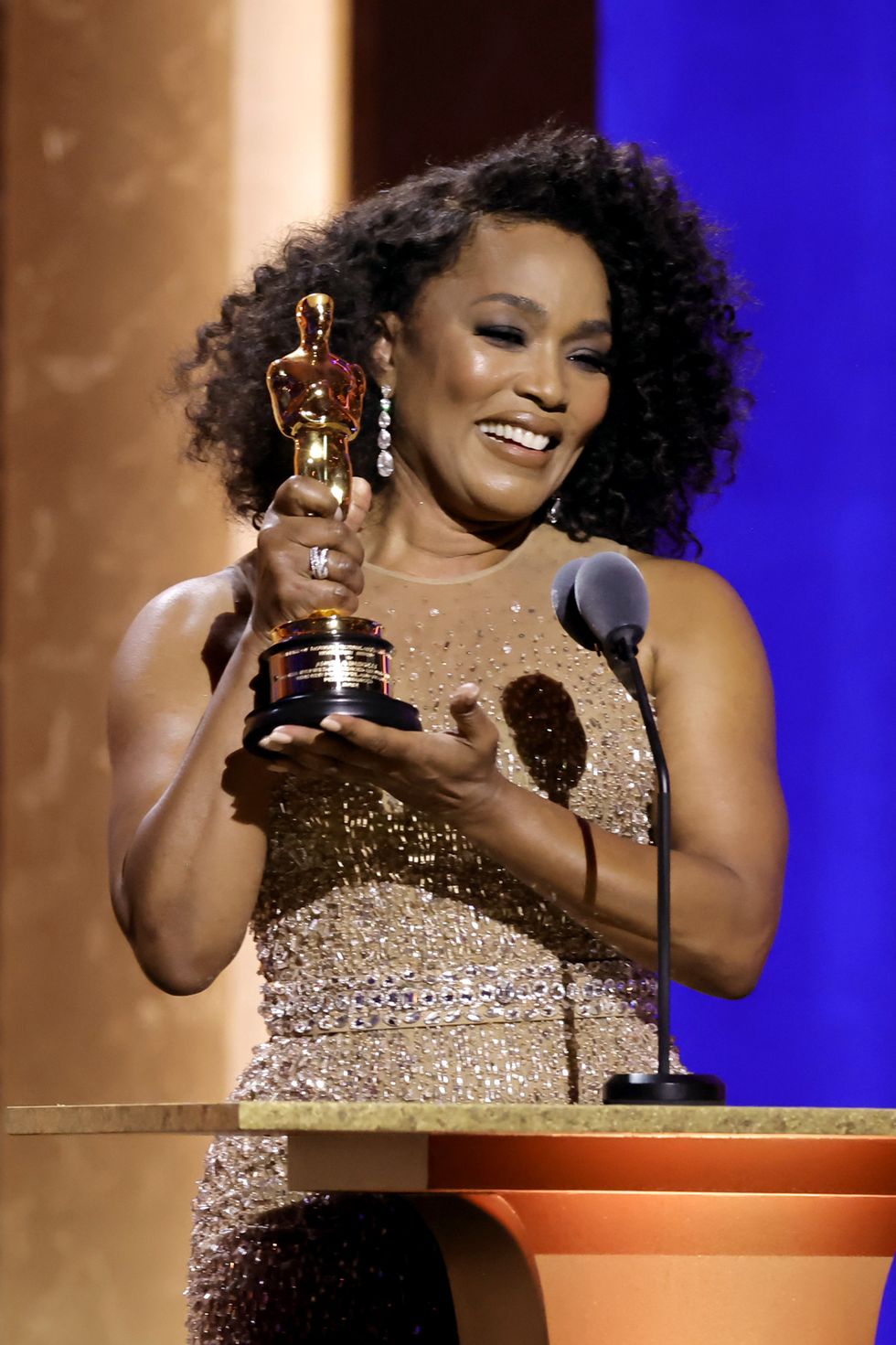
Photo by Kevin Winter/Getty Images
Academy Awards
In January 2024, the 66-year-old actress received an honorary Oscar for her esteemed career. This came after being nominated for the prestigious award twice, in 1994 for What's Love Got to Do with It and in 2023 for Black Panther: Wakanda Forever. During her speech, she reflected on her journey, her love for acting, and praised other Black actresses.
"Thank you, thank you to the Academy and the Board of Governors for this award," she said. "I have considered acting my calling and not just my career. I do this work because I find it meaningful and I hope in some way that it makes a difference and has an impact. To be recognized in this way for what I love doing is truly wonderful and I am beyond grateful."
Critics Choice Award
The mom of two won Best Supporting Actress at the 2023 Critics Choice Awards for her role as Queen Ramonda in Black Panther: Wakanda Forever.
BET Awards
The 9-1-1 actress won Best Actress at the 2023 BET Awards.
Golden Globes
In 2023, Angela received a Golden Globe for Best Performance by an Actress in a Supporting Role in Any Motion Picture for Black Panther: Wakanda Forever. She won her first Golden Globe in 1994 for her starring role in What's Love Got to Do with It.
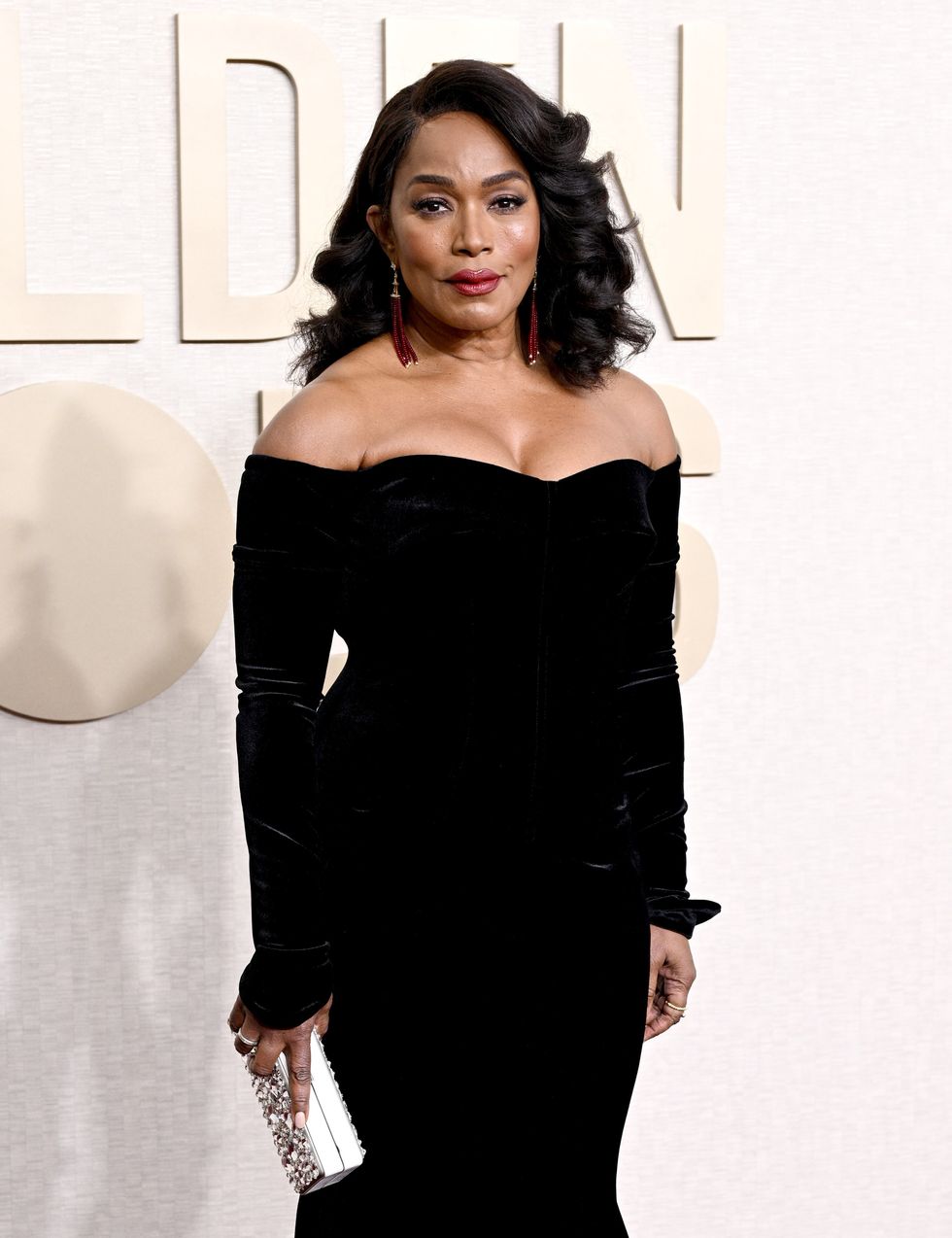
Photo by Lionel Hahn/Getty Images
Black Girls Rock!
In 2019, Angela was the recipient of the Icon Award for Black Girls Rock! She gave a rousing speech while accepting the award. "My purpose as a Black woman, as an actress, has always been to portray excellence on the screen, to be proud, unapologetic, and without regret," she said.
NAACP Image Awards
The decorated actress has won countless Image awards. In 2020, 2022, and 2023, Angela won Outstanding Actress in a Drama Series for 9-1-1. In 2023, she took home awards for Outstanding Supporting Actress in a Motion Picture for Black Panther: Wakanda Forever and the Entertainer of the Year.
Other films/ series she has Image awards for include What's Love Got to Do with It, How Stella Got Her Groove Back, Black Nativity, Music of the Heart, Ruby's Bucket of Blood, The Score, Malcolm X, Sunshine State, The Rosa Parks Story, and ER.
Screen Actors Guild Awards
Angela took home the award for Outstanding Performance by a Cast in a Motion Picture in Black Panther at the 2019 Screen Actors Guild Awards.
Walk of Fame
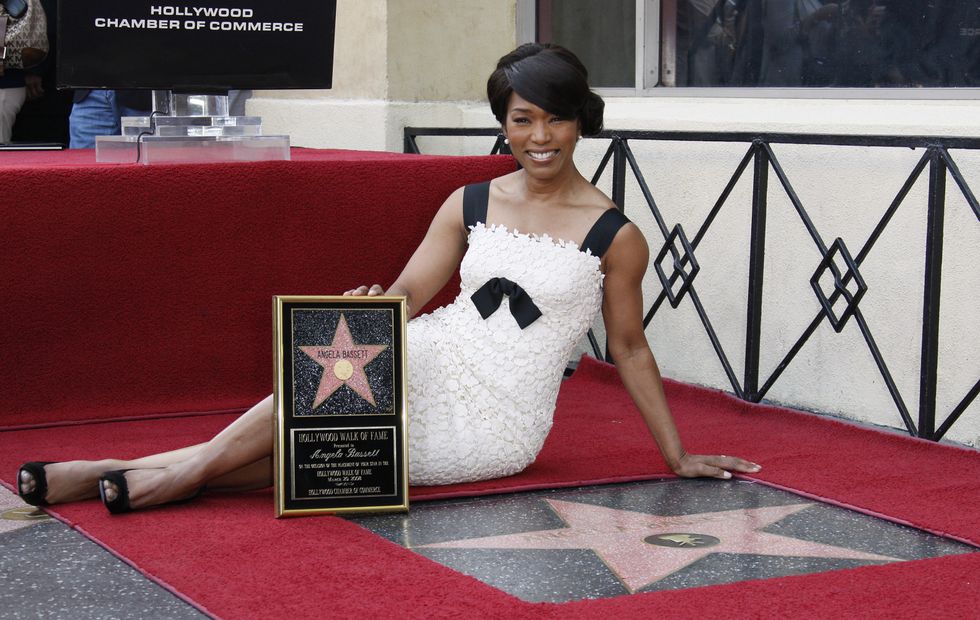
Photo by Jean Baptiste Lacroix/WireImage
The legendary received a star on the Hollywood Walk of Fame on March 20, 2008. During the ceremony, she reflected on when she first moved to L.A. to pursue her dreams. “I meant to stay six months, but I stayed. Today, my cup runneth over!” she said in her speech. “I am crying now, I cried yesterday and the day before. … This day is so, so special to me.”
Let’s make things inbox official! Sign up for the xoNecole newsletter for love, wellness, career, and exclusive content delivered straight to your inbox.
Feature image by Amy Sussman/Getty Images
Because We Are Still IT, Girl: It Girl 100 Returns
Last year, when our xoNecole team dropped our inaugural It Girl 100 honoree list, the world felt, ahem, a bit brighter.
It was March 2024, and we still had a Black woman as the Vice President of the United States. DEI rollbacks weren’t being tossed around like confetti. And more than 300,000 Black women were still gainfully employed in the workforce.
Though that was just nineteen months ago, things were different. Perhaps the world then felt more receptive to our light as Black women.
At the time, we launched It Girl 100 to spotlight the huge motion we were making as dope, GenZennial Black women leaving our mark on culture. The girls were on the rise, flourishing, drinking their water, minding their business, leading companies, and learning to do it all softly, in rest. We wanted to celebrate that momentum—because we love that for us.
So, we handpicked one hundred It Girls who embody that palpable It Factor moving through us as young Black women, the kind of motion lighting up the world both IRL and across the internet.
It Girl 100 became xoNecole’s most successful program, with the hashtag organically reaching more than forty million impressions on Instagram in just twenty-four hours. Yes, it caught on like wildfire because we celebrated some of the most brilliant and influential GenZennial women of color setting trends and shaping culture. But more than that, it resonated because the women we celebrated felt seen.
Many were already known in their industries for keeping this generation fly and lit, but rarely received recognition or flowers. It Girl 100 became a safe space to be uplifted, and for us as Black women to bask in what felt like an era of our brilliance, beauty, and boundless influence on full display.
And then, almost overnight, it was as if the rug was pulled from under us as Black women, as the It Girls of the world.
Our much-needed, much-deserved season of ease and soft living quickly metamorphosed into a time of self-preservation and survival. Our motion and economic progression seemed strategically slowed, our light under siege.
The air feels heavier now. The headlines colder. Our Black girl magic is being picked apart and politicized for simply existing.
With that climate shift, as we prepare to launch our second annual It Girl 100 honoree list, our team has had to dig deep on the purpose and intention behind this year’s list. Knowing the spirit of It Girl 100 is about motion, sauce, strides, and progression, how do we celebrate amid uncertainty and collective grief when the juice feels like it is being squeezed out of us?
As we wrestled with that question, we were reminded that this tension isn’t new. Black women have always had to find joy in the midst of struggle, to create light even in the darkest corners. We have carried the weight of scrutiny for generations, expected to be strong, to serve, to smile through the sting. But this moment feels different. It feels deeply personal.
We are living at the intersection of liberation and backlash. We are learning to take off our capes, to say no when we are tired, to embrace softness without apology.
And somehow, the world has found new ways to punish us for it.

In lifestyle, women like Kayla Nicole and Ayesha Curry have been ridiculed for daring to choose themselves. Tracee Ellis Ross was labeled bitter for speaking her truth about love. Meghan Markle, still, cannot breathe without critique.
In politics, Kamala Harris, Letitia James, and Jasmine Crockett are dragged through the mud for standing tall in rooms not built for them.
In sports, Angel Reese, Coco Gauff, and Taylor Townsend have been reminded that even excellence will not shield you from racism or judgment.

In business, visionaries like Diarrha N’Diaye-Mbaye and Melissa Butler are fighting to keep their dreams alive in an economy that too often forgets us first.
Even our icons, Beyoncé, Serena, and SZA, have faced criticism simply for evolving beyond the boxes society tried to keep them in.
From everyday women to cultural phenoms, the pattern is the same. Our light is being tested.

And yet, somehow, through it all, we are still showing up as that girl, and that deserves to be celebrated.
Because while the world debates our worth, we keep raising our value. And that proof is all around us.
This year alone, Naomi Osaka returned from motherhood and mental health challenges to reach the semifinals of the US Open. A’ja Wilson claimed another MVP, reminding us that beauty and dominance can coexist. Brandy and Monica are snatching our edges on tour. Kahlana Barfield Brown sold out her new line in the face of a retailer that had been canceled. And Melissa Butler’s company, The Lip Bar, is projecting a forty percent surge in sales.

We are no longer defining strength by how much pain we can endure. We are defining it by the unbreakable light we continue to radiate.
We are the women walking our daily steps and also continuing to run solid businesses. We are growing in love, taking solo trips, laughing until it hurts, raising babies and ideas, drinking our green juice, and praying our peace back into existence.
We are rediscovering the joy of rest and realizing that softness is not weakness, it is strategy.
And through it all, we continue to lift one another. Emma Grede is creating seats at the table. Valeisha Butterfield has started a fund for jobless Black women. Arian Simone is leading in media with fearless conviction. We are pouring into each other in ways the world rarely sees but always feels.

So yes, we are in the midst of societal warfare. Yes, we are being tested. Yes, we are facing economic strain, political targeting, and public scrutiny. But even war cannot dim a light that is divinely ours.
And we are still shining.
And we are still softening.
And we are still creating.
And we are still It.

That is the quiet magic of Black womanhood, our ability to hold both truth and triumph in the same breath, to say yes, and to life’s contradictions.
It is no coincidence that this year, as SheaMoisture embraces the message “Yes, And,” they stand beside us as partners in celebrating this class of It Girls. Because that phrase, those two simple words, capture the very essence of this moment.
Yes, we are tired. And we are still rising.
Yes, we are questioned. And we are the answer.
Yes, we are bruised. And we are still beautiful.

This year’s It Girl 100 is more than a list. It is a love letter to every Black woman who dares to live out loud in a world that would rather she whisper. This year’s class is living proof of “Yes, And,” women who are finding ways to thrive and to heal, to build and to rest, to lead and to love, all at once.
It is proof that our joy is not naive, our success not accidental. It is the reminder that our light has never needed permission.
So without further ado, we celebrate the It Girl 100 Class of 2025–2026.
We celebrate the millions of us who keep doing it with grace, grit, and glory.
Because despite it all, we still shine.
Because we are still her.
Because we are still IT, girl.
Meet all 100 women shaping culture in the It Girl 100 Class of 2025. View the complete list of honorees here.
Featured image by xoStaff
Restlessness. It’s a word that we all know the meaning of, and yet, when you are in your bed and you are actually experiencing restlessness — few things are less annoying. Because if there’s one thing that I’m pretty sure we all can agree on, it’s the fact that when we go to our bedroom, turn off the lights, and snuggle up in our sheets, what we want to do is fall asleep and stay that way — not toss and turn all throughout the night.
So, what causes us to have moments when we’re not experiencing the sound sleep that we so desire? While I wish that I had a black and white answer for you, the reality is that several different factors (sometimes working together) may be the cause. That’s the bad news.
The good news is that if you check out the 10 leading causes below, by process of elimination, you might be able to get to the root of your own restless evenings — so that you can finally get the kind of quality rest that you well deserve.
1. Eating (Too) Late
 Giphy
GiphyLet’s start off with one that has a couple of layers to it. Although it is a good idea to not have a large meal less than two hours before turning in, some experts do say that a light snack that consists of natural melanin, serotonin or tryptophan could be helpful.
The reason why eating too much before bedtime isn’t a good idea is because the digestive process can be a pretty active one. Plus, it increases your chances of experiencing acid reflux and heartburn. On the other hand, snacking on almonds or tart cherries (melatonin), cheese or pumpkin seeds (serotonin) or yogurt or peanut butter (tryptophan) can be just what you need to lull your system to sleep.
Bottom line here: It’s not if you eat but what you eat…and when.
2. Junk Food
 Giphy
GiphySpeaking of foods, if junk food is totally your thing, first check out “Why You Should Consider Leaving Fast Food Alone” — and then at least try avoiding that stuff if you’re heading off to bed. Fried foods are hard to digest. Sugary foods (and carbs) can raise your blood sugar levels. Processed foods contain a lot of salt and salt can raise your blood pressure which can result in sleep disturbances. So, if you’re in the habit of going through a drive-thru at night, here’s a good reason to rethink doing so in the future.
3. Your Bedroom Is Too Hot
 Giphy
GiphyThis one right here, I can absolutely attest to — because when I am hot in a room, I can pretty much kiss sound sleeping goodbye. SMDH. The problem here is that when your body temperature is high, that can mess with your REM (rapid eye movement) sleep. Not only that but, in order for your system to produce the melatonin that it needs to keep you sleeping soundly, your body needs to be at a cooler temperature. And that is why your room sitting at somewhere around 65 degrees is ideal.
4. Your Bedding
 Giphy
GiphyI have a friend who just bought a house and I’m getting him a comforter for a housewarming present. Listen, don’t sleep on the power of amazing bedding because it, too, plays a role in how well you rest. Of course, you need to invest in a good mattress (you can read more about that here and here); however, when it comes to things like your sheets and your comforter, there are a few things to keep in mind.
Your sheets need to be made out of breathable fabrics like cotton, not ones like nylon, polyester or even silk. The reason why is because the latter traps in heat and we’ve already discussed what an elevated body temperature can do to you. Oh, and if you’re someone who enjoys flannel sheets during the fall and winter season, it’s probably better to get some blankets that you can “layer your bed” with instead; flannel can get mighty hot in the midnight hour too.
It’s also important that your sheets aren’t too small or too big for your mattress because that can make your bed feel uncomfortable. And comforter-wise, try and go with a color that doesn’t overstimulate you — neutrals and shades of blues, greens and yellows can accomplish this for you. And P.S., one of the best comforter brands around? Coma Inducer. I’ve been rocking with them for several years at this point and I don’t have not one regret.
5. Java and/or Alcohol
 Giphy
GiphyI’m not much of a coffee drinker (although I do adore coffee ice cream; go figure). I didn’t grow up with it (tea was in abundance in my home) and so it’s not something that I ever really think about. I do have friends who will drink coffee before bedtime, though, and that baffles me because coffee (due to the caffeine that is in it) is a stimulant — and that for that reason alone, you’d be better off having it in the morning instead of at night.
As far as alcohol goes, although it technically it’s a depressant, for the first couple of hours that it is in your system, it acts like a stimulant — which means that it tends to put your system on quite the roller coaster ride; one that you should want to avoid if you’re trying to get a good night’s rest.
My recommendation? Go the tea route and sip on some chamomile, lavender, ginseng, green or passionflower tea. All contain properties that are proven to relax your mind, body and spirit, so that you can fall asleep quicker and stay asleep longer.
6. Stress and Anxiety
 Giphy
GiphyListen, the summer of 2025 for me? Whew, chile (check out “I've Been Estranged From My Mom For Years. She Died Last Week.” and “I Was Hired To Be An Online Life Coach. Then Got Scammed For $4K. Here's How To Avoid This.”). Other than the couple of weeks when my mother was on a swift decline (and I was concerned about her physical suffering), thankfully, I didn’t lose much sleep, though — and praise the Lord for that because stress (and anxiety) definitely have a way of jacking up sleep patterns.
That’s because when you are stressed out, your cortisol (which is your stress hormone) spikes and that can hinder sound sleep — which can result in you feeling fatigued and irritable throughout the day. So, if you are stressed out — exercise, journal, meditate, spend quality time with fun and supportive people…oh, and have sex. All of these things are proven ways to calm and relax you — on a few different levels.
7. Late Day Naps
 Giphy
GiphyI adore sleep — always have. So, I can’t even say that it’s my age that has a sistah out here excited about taking a nap in the middle of the day (I work from home). And what I have to watch is not napping for too long or taking a nap that is too late in the day. Why? Because it can totally jack up my sleep patterns because it ends up throwing off my sleep schedule.
According to sleep experts, the way to avoid this is by scheduling your nap out about eight hours before your bedtime and also making sure that your nap doesn’t last any longer than 30 minutes (set an alarm, if you have to). If you do both of these things, you can get the benefits of a nap and the benefits of 6-8 hours of sleep without having to compromise either one.
8. Not Having a Sleep Schedule
 Giphy
GiphyAs humans, we really are creatures of habit. In fact, if you do something consistently enough, it can become automatic to you — it can end up being something that you do without really thinking about it at all. And that’s why it’s a good idea to at least consider coming up with some sort of a sleep schedule; that way, you can train your mind and body to have a pattern of rest.
The beauty of this is a sleep schedule can help you to reduce your stress levels, strengthen your brain, maintain a healthy weight, put you in a better mood and make you more productive throughout the day. On the other hand, not having a sleep schedule can make it really challenging for you to get quality rest at night. It only takes a few minutes to come up with a schedule and it’s well worth your time.
9. Too Much Stuff on Your Bed
 Giphy
GiphyEver heard that a cluttered desk reveals a cluttered mind? If you believe that, how in the world could this not translate to a bed as well? Hell, I even read an article which said that having a lot of stuff underneath your bed can wreck your sleep because it can trigger feelings of anxiety and restlessness and that’s because clutter can overstimulate you and keep you from being at peace.
Look, there’s no telling how many times I’ve said that bedrooms are for sex and sleep only (many interior designers feel the same way) — which means that your bed shouldn’t look like a makeshift office, it shouldn’t have clothes all over it and, even if you are an avid reader, it shouldn’t look like a horizontal bookshelf (where’s your nightstand at?).
You need to feel free to move comfortably about on your bed throughout the night — which ALSO means that, although I personally call pillows “stuffed animals for adults,” you still don’t need a ton of those on your bed either; two for sleeping and 2-3 more for décor purposes are typically ideal.
10. Your Damn Cell Phone
 Giphy
GiphyYou’ve probably heard this before and yet, since reportedly most of us check our phones somewhere around 205 times a day — I’m willing to bet that at least 10 of those times are while you’re in bed or when you’re up to make a bathroom run in the middle of the night. Yeah, as tempting as that might be, try to break that habit because the blue light that emits from your phone can disrupt how your system processes melatonin — and that is another way that you can find yourself really struggling to fall asleep again.
Whatever is on your phone, it can’t wait. It’s not worth your beauty sleep, chile.
BONUS: Imbalanced Hormones
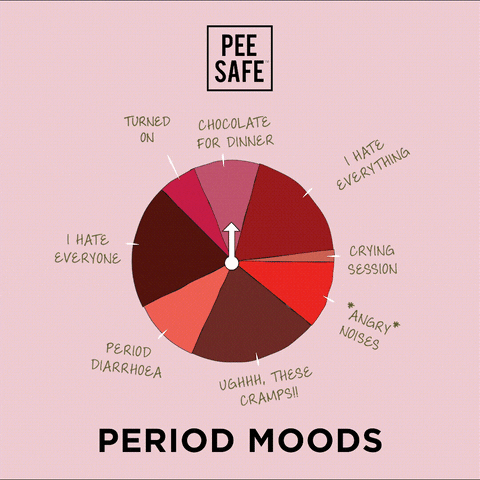 Giphy
GiphyHormonal imbalance is absolutely something that can have you tossing and turning all night long. If it’s due to all that is going on with you the week before your period, try exercising earlier in the day in order to help you sleep more soundly at night. If it’s because you are in the latter stages of perimenopause, consuming foods that are rich in phytoestrogens (plant-based estrogen) could help to level things out. Some of those foods include sesame seeds, garlic, peaches, berries and cabbage.
____
YOU NEED SLEEP. Yes, I am yelling it because nothing is worth compromising it.
So, if you see yourself in anything that I just said, try making some adjustments tonight.
Within a week or so, you should find yourself sleeping more and tossin’ and turnin’ a heck of a lot less.
Beautiful.
Let’s make things inbox official! Sign up for the xoNecole newsletter for daily love, wellness, career, and exclusive content delivered straight to your inbox.
Featured image by TheVisualsYouNeed/Shutterstock









